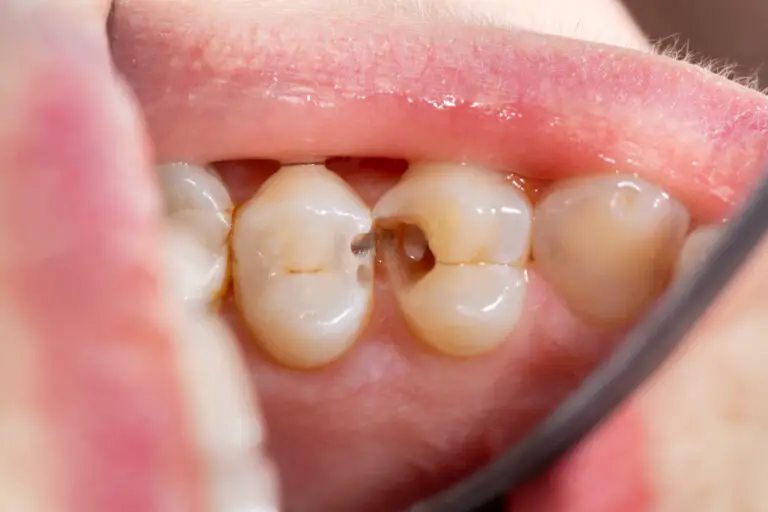Having an odd or uncomfortable sensation when your tongue touches your teeth is quite common. You may notice the feeling more when brushing your teeth or eating. Some describe it as a nails-on-the-chalkboard type of sensitivity. Others say it makes their teeth feel fuzzy or tingly.
Whatever the description, there is often an underlying reason why teeth bother us when tongue contact occurs. In this comprehensive article, we’ll dive deeper into why this happens, what causes it, tips for relief, and when to see a dentist about bothersome sensitivity.
Detailed Explanations for Tooth Sensitivity
Teeth have a complex structure composed of different layers. The outer enamel shields the more sensitive interior sections. When this enamel erodes or thins, you become more vulnerable to sensations upon tongue touch. Here’s a more in-depth look at what’s going on inside the tooth:
Enamel Loss Exposes Dentin Underneath
Enamel is the hard, protective shield encasing the entire tooth above the gum line. This mineral-rich layer is normally thick enough to protect against sensations. But certain factors can break down enamel over time:
- Acidic Foods and Drinks: Things like carbonated beverages, citrus fruits, vinegar, and wine erode enamel through a process called demineralization. This strips away vital minerals like calcium and phosphate from the enamel surface.
- Teeth Grinding and Clenching: This abrasive habit wears down enamel through chronic friction against other teeth. Grinding often worsens with stress and occurs subconsciously during sleep.
- Gum Disease and Improper Flossing: Bacteria accumulates below the gum line and causes inflammation and pockets. As more gum tissue and bone are destroyed, the enamel anchor is lost and more root surface is exposed.
- Gastric Reflux or Frequent Vomiting: Stomach acids are very erosive to enamel, especially the back of teeth frequently bathed in reflux. The lower esophageal sphincter prevents backwash of these acids normally.
- Aging: Saliva flow decreases as we get older, reducing its neutralizing and remineralizing effect on enamel.
As enamel thins, it exposes the more sensitive second layer called dentin. This softer material then lies vulnerable to tongue sensations.
Dentin and Pulp Structure Transmits Sensations
Underneath the enamel lies dentin, a porous and flexible material full of microscopic tubules. These tubules are fluid-filled channels that lead right to the inner tooth pulp. The pulp contains nerves and blood vessels for each tooth.
Dentin tubules are normally protected by a mineralized “smear layer” that blocks sensitivity. But when thinned enamel erodes, the underlying dentin lacks this protective barrier. Contact with abrasive foods, temperature changes, sweets, acids, and the tongue then gets transmitted straight to the nerves via the opened dentin tubules.
This stimulation of the intricate nerve network within the dentin and pulp is what causes sharp pain, tingling, or uncomfortable sensations. Even mild irritants now have easier access to trigger these sensations.
Gum Line Exposure Totally Removes Enamel
Gum recession exposes not just thinner enamel but total loss of enamel coverage near the roots. This occurs when cumulative plaque causes gums to detach and recede from teeth. Without any enamel barrier on the root, dentin is completely exposed to the elements.
Since gums have retreated,tooth roots are also newly vulnerable to tongue abrasion during brushing. The cementum covering roots doesn’t provide nearly the same degree of protection as durable enamel.
Cracks and Chips Can Penetrate to Dentin
Cracks or chips in enamel create defects that allow penetration to the lower layers. Cracks infiltrate deep into the tooth, allowing debris, acids, and air to stimulate the inner dentin and pulp tissue. Major chips that fracture off chunks of enamel also remove its insulation and expose dentin beneath.
Causes of cracks include chewing hard foods, ice cubes, hard candies, popcorn kernels, or other trauma. Teeth grinding also places enormous pressures on teeth that can cause both tiny and visible cracks to form.
Dental Work Can Cause Inflammation
Many dental procedures aim to address enamel loss and dentin exposure. But they can also inflame and irritate the inner pulp temporarily:
- Tooth Whitening: Chemicals like hydrogen peroxide can make teeth feel extra sensitive for a period after use. This eventually fades as pulp inflammation resolves.
- Dental Fillings and Crowns: Minor irritation after placement is common until tissues stabilize. Larger fillings are more likely to increase sensitivity.
- Dental Cleanings: Scraping plaque and tartar away can uncover softened enamel and new areas of exposed dentin that then feel sensitive.
So in summary, a variety of processes can diminish enamel coverage and make the interior sections of the tooth more vulnerable and reactive to tongue stimulation.
Why Exactly Does the Tongue Cause Weird Feelings?

Now that we’ve explored how tooth sensitivity develops, why does contact with the tongue provoke such odd and unpleasant sensations in the first place? Here are some of the reasons:
- The upper surface of the tongue contains numerous raised papillae. These bumpy elevations house the thousands of taste buds. The papillae and their rough texture accentuate sensations when rubbed over sensitive teeth. Those with “hairy tongue” from elongated papillae experience this even more.
- Saliva helps provide a protective fluid barrier. It also neutralizes acids and contains minerals to help re-harden softened enamel. Tongue friction can wipe some of this beneficial saliva coating away, leaving sensitive areas newly exposed.
- Those with dry mouth or dehydration may have less saliva present to begin with. This leads to more irritation since saliva’s lubricating benefits are limited.
- Dragging the tongue repetitively over sore areas often happens subconsciously as the brain tries to identify discomfort. But this only serves to stimulate the sensitive spot again and again. The light touch of the tongue can be enough to trigger sharp pain.
- Geographic tongue, or benign migratory glossitis, causes irregular smooth patches on the surface of the tongue. As these patches migrate to new areas, they can rub painfully over sensitized teeth. Geographic tongue is also linked to vitamin deficiencies causing various oral irritations.
So in summary, the tongue’s texture, moisture level, and constant motion over vulnerable teeth amplifies sensations originating from exposed dentin and inner tooth structures.
Seeing a Dentist for Severe Sensitivity
Occasional mild sensitivity from tongue contact isn’t too concerning on its own. Proper oral care and over-the-counter pastes can often provide relief in these cases. But if sensitivity is severe enough to disrupt normal function, it requires prompt dental evaluation.
See a dentist right away if you experience:
- Difficulty with normal activities like eating, drinking, brushing due to significant pain
- Sudden, intense sensitivity arising seemingly out of nowhere
- Sensitivity lasting longer than 2-3 weeks despite diligent oral hygiene
- Bleeding, swelling, or discharge from around the affected tooth
- Visible damage like cracks, fractures, or cavities accompanying the sensitivity
There are several diagnostic tools dentists can use to evaluate abnormal sensitivity:
- Dental exam to look for visual signs of decay, cracks, gum recession, erosion
- X-rays to reveal issues like infections or abscesses below the enamel
- Individual testing with temperature, air pressure, sugar, and acidic stimulation to identify the precise triggers
Once the cause is found, options for reducing discomfort include:
- Fluoride varnish or sealing agents applied to the tooth surface to replenish minerals and seal out sensitivity triggers
- Higher strength prescription toothpastes like Sensodyne with ingredients to numb and block pain signals
- Restorations like fillings, crowns, or gum grafts if defects allow irritation of the inner tooth layers
- Night guards for grinding/clenching to prevent further enamel wear
- Root planing and dental cleanings to treat and prevent gum recession
Getting evaluated promptly allows dentists to diagnose any major risks and intervene before lasting damage or discomfort occurs. Don’t delay on seeking help for persistent or severe tooth sensitivity!
Tips to Minimize Sensitivity from Tongue Contact

If your teeth are only mildly bothered by tongue contact, there are some simple home approaches you can try for relief:
- Use a soft bristle toothbrush and gentle brushing stroke: Hard bristled brushes combined with aggressive scrubbing accelerate enamel loss over time. Holding your brush at a 45 degree angle to the gum line avoids excess friction.
- Rinse mouth with baking soda diluted in water: The alkaline properties help neutralize acids from foods and drinks that demineralize enamel. Rinsing after meals prevents prolonged acid contact.
- Drink with a straw: Using a straw helps guide beverages past your teeth, reducing contact time and damage on surfaces. This goes for acidic drinks like soda that are extra erosive.
- Avoid hard, sticky, or acidic foods: Crunchy items like apples, carrots, chips and chewy sweets increase friction on teeth. Citrus, vinegar, wine, and soda are also very acidic.
- Use toothpaste for sensitive teeth: Brands like Sensodyne contain potassium nitrate and other ingredients that numb and desensitize aggravated nerves in dentin tubules.
- Avoid whitening products: Ingredients like hydrogen peroxide can greatly irritate the inner pulp and cause sensitivity for a period of days after use.
- Wear a nightguard: Guards protect teeth from grinding pressures during sleep that damage enamel. Your dentist can provide custom fit ones.
- Get more frequent cleanings: Regular dental cleanings remove plaque that leads to gum recession and further sensitivity if left to accumulate. Most dentists recommend professional cleanings every 6 months.
- Chew xylitol gum: Xylitol helps boost protective saliva flow while also inhibiting cavity-causing bacteria. Opt for sugar-free gum to prevent damage to enamel.
- Use a soft-bristled tongue scraper: Gently removes debris without abrading the sensitive tooth surfaces like a stiff brush can. Keeping your tongue cleaner may also reduce discomfort.
- Drink more water: Helps increase saliva volume and circulation to promote natural remineralization and lubrication of teeth. This combats dry mouth that worsens sensitivity.
Persistence of sensitivity over 2-3 weeks warrants a dental visit to diagnose and resolve the problem early. Otherwise, these self-help tips can alleviate milder irritation in the meantime.
Frequently Asked Questions About Tooth Sensitivity
Here are answers to some common questions about teeth that hurt when licked or touched:
Why are only some of my teeth sensitive and not all of them?
Sensitivity can vary between different teeth depending on factors like:
- Uneven gum recession with deeper pockets and root exposure in some areas
- Previous dental work like fillings, crowns or whitening only affecting certain teeth
- Extent of inner layers exposed by cracks or fractures present in particular teeth but not others
- Individual differences in enamel thickness, tubule depth, dentin density among the teeth
- Increased pressures from biting or grinding on select teeth over time
So rather than an all-or-nothing problem, sensitivity impacts teeth to differing degrees based on their individual exposures and vulnerabilities.
Does sensitivity mean I have a cavity?
Tooth decay is one potential cause of sensitivity, but there are also other explanations like receding gums, cracked enamel, and prior dental procedures. An exam and x-rays are required for a dentist to confirm decay as the culprit.
However, teeth vulnerable enough to manifest sensitivity often have weaker, softer enamel overall. This does put them at higher long-term cavity risk without proper preventative care. So increased sensitivity should still warrant greater diligence with brushing, fluoride, diet, and dental visits to reduce the odds of future decay.
Why do cold foods and drinks hurt my teeth if it’s my tongue causing the sensitivity?
This is because the various triggers like tongue, temperature, and sweets all impact the inner tooth layers through the same mechanism – the exposed dentin tubules. Once open pathways to the nerves exist due to enamel deficiency, many forms of stimulation can generate discomfort. So tongue contact and cold sensitivity often occur together as signs of the same underlying issue.
Is sensitive teeth something serious or can it be left alone?
Mild sensitivity that briefly flares up from things like whitening or ice cream aren’t too concerning on their own. But chronic, severe, or growing sensitivity can potentially indicate issues needing urgent dental care, like infections, gum disease progression, or untreated cracks reaching the pulp. Leaving these to worsen risks significant tooth damage, so it’s safest to get evaluated.
Why do my teeth hurt after a dental cleaning at the dentist?
Scraping plaque and tartar during a cleaning can uncover softer areas of enamel that then get irritated by environmental factors they were previously shielded from. Gum measurements may also show new recession that’s exposing additional root and dentin surfaces vulnerable to sensation. The freshly cleaned areas will likely calm down within a few days. But consistent sensitivity after cleanings can mean more aggressive gum disease or enamel loss present.
Hopefully this gives you a better understanding of why teeth can feel uncomfortable or painful when licked, brushed, or touched by the tongue. While manageable at home initially, worsening sensitivity warrants a prompt visit to your dentist to evaluate for any underlying risks requiring treatment. Don’t delay in seeking guidance if tooth sensitivity continues to disrupt your normal oral function.







